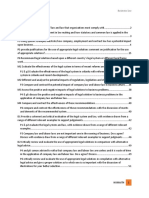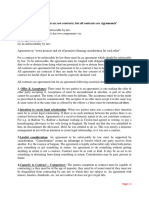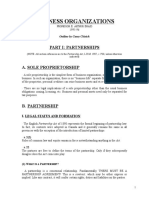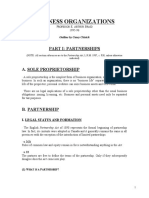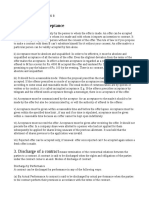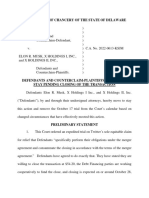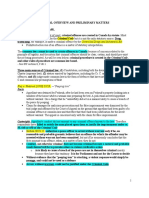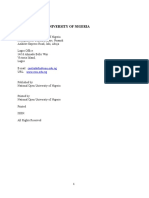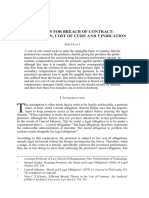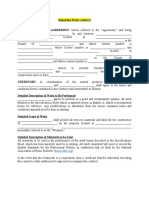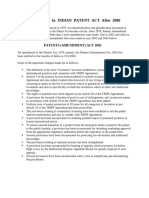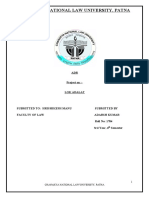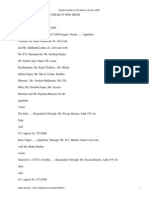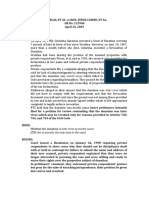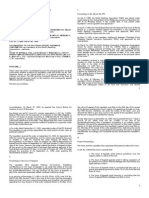Professional Documents
Culture Documents
LAW OF Contract
LAW OF Contract
Uploaded by
Khurshid Manzoor MalikOriginal Description:
Copyright
Available Formats
Share this document
Did you find this document useful?
Is this content inappropriate?
Report this DocumentCopyright:
Available Formats
LAW OF Contract
LAW OF Contract
Uploaded by
Khurshid Manzoor MalikCopyright:
Available Formats
Contract 5.
Death of promisor Contract of Guarantee means a contract to perform the promises made
Act and agreement enforceable by law or discharge the liabilities of the third person in case of his failure to
6. Lapse of time
discharge such liabilities.
Purpose of contract a. Time period decided in contract
Law full purpose b. Time period settled under limitation act
Moral purpose Salient features of contract of Guarantee
Mistake
Not to injure any party and other person In contract law, a mistake is an erroneous belief, at contracting, that 1. A valid contract
Essentials of contract certain facts are true. It can be argued as a defense, and if raised 2. Written or oral
1. Free consent of parties successfully can lead to the agreement in question being found void ab 3. Consideration
2. Lawful and moral object initio or voidable, or alternatively an equitable remedy may be provided 4. Numbers of parties
3. Acceptance by the courts. 5. Tripartite agreement
4. Lawful consideration 6. Nature of liability
Kinds of Mistake and effects of mistakes 7. Arising of liability of security
5. Capacity of party
i. Mistake of fact 8. Express or implied contract of guarantee
6. Certainty of party
ii. Mistake of law Contract of sale of goods:
7. Legal relations Mistake of fact is a contract, whereby, the seller transfers or agrees to transfer
8. Enforceable by law Overview. Any mistaken belief other than a mistake of law. Examples the property in goods to the buyer for a price. There can be a
Essentials of valid acceptance are: include erroneous beliefs about the meaning of some term or about the contract of sale between one part-owner and another.
Free consent identity of some person. In criminal law, a mistake of fact can usually ESSENTIALS ELEMENTS OF A CONTRACT OF SALE
Correspondence between proposal and acceptance operate as a defense so long as it is reasonable. The following six features are essential elements of any contract of sale
Communication of acceptance of goods.
a. Unilateral Mistake
Absolute acceptance
before revocation of proposal b. In other words, a unilateral mistake occurs when only Goods
Who can make acceptance?
one party is mistaken as to the subject matter or the Price
terms contained in the contract agreement. This type
Same meeting of mistake is generally more common than other types of Two parties
Consideration
Payment or money. A vital element in the law of contacts, consideration
contract mistakes, such as a mutual mistake (an error Transfer of ownership
is benefit which must be bargained for between the parties, and is the
that is shared by both parties).
Party’s own mistake
All Essentials of a Valid Contract of Sale
essential reason to a party entering into a contract. Mistake cause by fraud etc. Includes both a ‘sale‘ and ‘an agreement to sell‘
Rules relating to consideration c. Bilateral Mistake Ingredients of contract of sale
Lawful consideration An error on the part of both parties of a transaction regarding Competent parties
Doubtful consideration the same matter, such as if two people sign a contract under a
Immoral consideration certain understanding, while the contract actually conveys a Mutual consent
Imposible consideration
different meaning than they each may have expected. Transfer of property
Essentials of bilateral mistake
Unlawful consideration
Mistake of both parties Consideration
Inadequate consideration
Parties of contract
Relation between mistake and fact Oral or written agreement
Competency of parties
Relation between fact & agreement
Types of Bilateral Mistake
Absolute or conditions
i. Major Difference between sale and agreement to sell
Mistake about the subject matter
ii. Minor Mistake about the price of subject matter Nature of contract
iii. Person of sound mind Mistake about the quality of subject matter Risk of loss
iv. Person of unsound mind Mistake about the quantity of subject matter
Lunatic Mistake about the identity of the subject matter Types of goods
Idiot Mistake about the ownership of subject matter Consequences of breach
Insane
Intoxicated Obligation of a person, who has received advantage under void
Transfer of property
Novation Contract agreement or contract, which has been become void Jus in tem and jus in personum
Novation, in contract law and business law, is the act of – replacing an Delivery
obligation to perform with another obligation; or. adding an obligation Transfer of possession from one person to another person. Transfer of
goods from seller to buyer
to perform; or. replacing a party to an agreement with a new party.
65. Obligation of person who has received advantage under void Modes of Delivery:
Essentials of Novation of Contract
agreement, or contract that becomes void i. Actual delivery
I. Extinction of old contrat and creation of new valid ii. Symbolic delivery
contract iii. Implied or constructive delivery.
II. Free consent of the parties When an agreement is discovered to be void, or when a contract becomes
III. Creation of new right void, any person who has received any advantage under such agreement
IV. Specific liability present in old contract or contract is bound to restore, it, or to make compensation for it, to the
Contingent Contract person from whom he received it.Illustrations
A "contingent contract" is a contract to do or not to do something, if
some event, collateral to such contract, does or does not happen.
Illustration. A contracts to pay to B Rs. 10,000 if B's house is burnt. This (a) A pays B 1,000 rupees, in consideration of B's promising to marry C,
is a contingent contract. A's daughter. C is dead at the time of promise. The agreement is void, but
B must repay A the 1,000 rupees.
Enforcement or performance of contingent contract
(i) Happening of a future uncertain event (b) A contracts with B to deliver to him 250 maunds of rice before the first
(ii) Non-Happening of a future uncertain event of May. A delivers 130 maunds only before that day, and none after. B
(iii) Furture conduct of a live person retains the 130 maunds after the first of May. He is bound to pay A for
them.
(iv) Happening event within fixed time
(v) Non- Happening event within fixed time
(vi) Impossible event (c) A, a singer, contracts with B, the manager of a theatre, to sing at his
theatre for two nights in every week during the next two months, and B
Discharge of contract engages to pay her hundred rupees for each night's performance. On the
Discharge of a Contract Law and Legal Definition. Discharge of sixth night, A willfully absents herself from the theatre, and B, in
a contract means termination of a contract. It is the act of making consequence, rescinds the contract. B must pay A for the five nights on
a contract or agreement null. A discharged contract refers which she had sung.
to contract that is fully performed.
Various ways in which contract can be discharged: (d) A contracts to sing for B at a concert for 1,000 rupees, which are paid
1. Performance of contract in advance. A is too ill to sing. A is not bound to make compensation to B
for the loss of profit which B would have made if A had been able to sing,
a. Fulfillment of promise
b. Fulfillment of conditions and obligations but must refund to B the 1,000 rupees paid in advance.
c. Fulfillment within decided time period
Void agreement and exceptions to example of void agreement
2. Agreement or consent of parties to contract
a. Consent of both the parties to contract Legally, a void agreement means which is not enforceable by
b. Release from obligations law.the contract or agreement is no longer enforceable.
c. Free consent
i. Invalidity
3. Breach of contract
a. Non-observation of contractual obligations ii. Performance
b. Break if contractual conditions iii. Binding
4. Frustration iv. Enforcement
a. Change in circumstances v. Legal effect
b. Non fault of either of parties vi. Not rights and obligations
c. impossibility
You might also like
- LSP Temporary Emergency Exemption To Specific Federal Motor Carrier Safety Regulations 01-12-2024Document1 pageLSP Temporary Emergency Exemption To Specific Federal Motor Carrier Safety Regulations 01-12-2024KALB DIGITALNo ratings yet
- Settlement AgreementDocument2 pagesSettlement AgreementLegal Forms100% (3)
- Legal Environment of Business A Managerial Approach Theory To Practice 3rd Edition Melvin Solutions ManualDocument19 pagesLegal Environment of Business A Managerial Approach Theory To Practice 3rd Edition Melvin Solutions ManualJaimeMorgangcme100% (48)
- Template Independent Contractor AgreementDocument2 pagesTemplate Independent Contractor AgreementNicolás Greco57% (7)
- Types of Contracts Contracts Under Seal TraditionallyDocument12 pagesTypes of Contracts Contracts Under Seal TraditionallyAndrew_Magraci_2381100% (3)
- Right To A Fair TrialDocument22 pagesRight To A Fair TrialRitika Rishi100% (1)
- Business Law HMDocument70 pagesBusiness Law HMfahmeetha100% (1)
- Authority To Act SS313Document6 pagesAuthority To Act SS313Matthew Davies0% (1)
- Types of ContractDocument9 pagesTypes of ContractCoc Rush100% (1)
- Construction Subcontractor Agreement: Page 1 of 8Document8 pagesConstruction Subcontractor Agreement: Page 1 of 8Ronnie Jereza100% (1)
- Legal Forms-Contracts and AgreementsDocument115 pagesLegal Forms-Contracts and AgreementsNiko Mangaoil Aguilar100% (2)
- Making of Ipc: Damodaram Sanjivayya National Law University Sabbavaram, Visakhapatnam - 531035, Andhra PradeshDocument19 pagesMaking of Ipc: Damodaram Sanjivayya National Law University Sabbavaram, Visakhapatnam - 531035, Andhra Pradeshmeghana ravaliNo ratings yet
- Construction Contract: THIS CONSTRUCTION AGREEMENT, Herein Referred To The "Agreement," and Being ExecutedDocument12 pagesConstruction Contract: THIS CONSTRUCTION AGREEMENT, Herein Referred To The "Agreement," and Being ExecutedMohit DehrajNo ratings yet
- Barter Agreement PDFDocument4 pagesBarter Agreement PDFFaceApparel BeautyBarNo ratings yet
- Auto Clean N Shine (1997) 2 SLR (R) 0427Document12 pagesAuto Clean N Shine (1997) 2 SLR (R) 0427rajashree84No ratings yet
- Sample Request For Statement of Decision in California EvictionDocument3 pagesSample Request For Statement of Decision in California EvictionStan BurmanNo ratings yet
- Summary ContractsDocument3 pagesSummary ContractsBhagath Gottipati100% (1)
- Expressed or Implied Contracts: Contract LawDocument5 pagesExpressed or Implied Contracts: Contract LawTy100% (2)
- Business LawDocument2 pagesBusiness LawMd. RuHul A.No ratings yet
- Discharge of Contract FINALDocument6 pagesDischarge of Contract FINALRavikant SharmaNo ratings yet
- Summery of Business Law-1Document25 pagesSummery of Business Law-1Khader MohamedNo ratings yet
- All Contracts Are Agreement But All Agreements Are Not ContractDocument3 pagesAll Contracts Are Agreement But All Agreements Are Not ContractRoshani Tamang80% (5)
- Partnerships - Corporate LawDocument36 pagesPartnerships - Corporate LawNatalie Tremblay100% (1)
- Name: Mahad Taimoor Roll # L1S20BBAM021 Subject: Business Law Section: ADocument15 pagesName: Mahad Taimoor Roll # L1S20BBAM021 Subject: Business Law Section: AMehwish TaimoorNo ratings yet
- Partnerships (Braid) 95-96 ChisickDocument38 pagesPartnerships (Braid) 95-96 ChisickCrystalNo ratings yet
- Legal Aspects of Business AssignementDocument6 pagesLegal Aspects of Business AssignementShameel AndhoorathodiNo ratings yet
- Indemnity and Guarantee ContractDocument4 pagesIndemnity and Guarantee ContractAnonymous v5QjDW2eHx100% (1)
- 2.legal Rules of Acceptance: 3. Discharge of A ContractDocument5 pages2.legal Rules of Acceptance: 3. Discharge of A ContractvvishaljaswaNo ratings yet
- Summery of Business Law-1 2Document21 pagesSummery of Business Law-1 2Mona A Hassan100% (1)
- Defendants and Counterclaim-Plaintiffs' Motion To Stay Pending Closing of The TransactionDocument15 pagesDefendants and Counterclaim-Plaintiffs' Motion To Stay Pending Closing of The TransactionTechCrunch0% (2)
- Criminal Law: Running Head: 1Document11 pagesCriminal Law: Running Head: 1alexNo ratings yet
- Partnership Agreement: State of New York Rev. 133C834Document6 pagesPartnership Agreement: State of New York Rev. 133C834wewNo ratings yet
- 1 Chapter LawDocument18 pages1 Chapter LawJose VirtualNo ratings yet
- Classification of ContractsDocument15 pagesClassification of ContractsmadhavNo ratings yet
- Businessregulatoryframeworkmcqsslideshare 230524162337 E3eb4ba7Document33 pagesBusinessregulatoryframeworkmcqsslideshare 230524162337 E3eb4ba7jack jackNo ratings yet
- A2 - Contmgmt2&3Document10 pagesA2 - Contmgmt2&3ideyNo ratings yet
- HE Ower and Imits of Eaching Thics in The LassroomDocument14 pagesHE Ower and Imits of Eaching Thics in The LassroomVanessa GaringoNo ratings yet
- Judicial Branch in A Flash 1Document10 pagesJudicial Branch in A Flash 1api-313615727100% (1)
- Criminal Law Final OutlineDocument35 pagesCriminal Law Final Outlineasahni824No ratings yet
- Criminal Outline Coyne 2002Document33 pagesCriminal Outline Coyne 2002Phan NguyenNo ratings yet
- Accounting ContractDocument4 pagesAccounting ContractLarry NopreNo ratings yet
- 28 October 2020 08:53Document1 page28 October 2020 08:53Anay MehrotraNo ratings yet
- Probable Cause AffidavitDocument10 pagesProbable Cause AffidavitJulia Huffman67% (3)
- Untitled DocumentDocument3 pagesUntitled DocumentJra KonstrakNo ratings yet
- Crim Brodhagen 2019Document215 pagesCrim Brodhagen 2019Mostwanted 77No ratings yet
- Stages of CrimesDocument16 pagesStages of CrimesAnonymous mpgedaEft100% (1)
- Federal Government Approaches To Issuing Biometric Ids: Part IiDocument79 pagesFederal Government Approaches To Issuing Biometric Ids: Part IiScribd Government DocsNo ratings yet
- Work ContractDocument3 pagesWork ContractMonjurul Karim100% (3)
- An Introduction To LawDocument236 pagesAn Introduction To LawTitima NyumNo ratings yet
- Nature of CrimeDocument105 pagesNature of CrimeRajat100% (1)
- MOUDocument2 pagesMOUFieza ZainulNo ratings yet
- Chapter I - The State and The Constitution Section 1 - The StateDocument28 pagesChapter I - The State and The Constitution Section 1 - The StateMeenachee TandrayenNo ratings yet
- Prosecution Journal, Vol 4 - 1544166889 PDFDocument471 pagesProsecution Journal, Vol 4 - 1544166889 PDF9999999999999-567421No ratings yet
- Chapter Two Nature and Kinds of ContractsDocument8 pagesChapter Two Nature and Kinds of ContractsHarshad SavantNo ratings yet
- Employment Contract 34Document6 pagesEmployment Contract 34PRIYANKA SINGH80% (5)
- Taxation Law 1994-2006Document242 pagesTaxation Law 1994-2006Zina CaidicNo ratings yet
- Multiple Choice QuestionsDocument5 pagesMultiple Choice QuestionsRegina Mol100% (2)
- Compensation For Breach of Employment ContractDocument28 pagesCompensation For Breach of Employment ContractIbnu HassanNo ratings yet
- THIS CONSTRUCTION AGREEMENT, Herein Referred To The "Agreement," and BeingDocument13 pagesTHIS CONSTRUCTION AGREEMENT, Herein Referred To The "Agreement," and BeingMohit DudhmogreNo ratings yet
- Banking and Its TypesDocument5 pagesBanking and Its Typesविनीत जैनNo ratings yet
- Contract Law: For Other Uses, SeeDocument25 pagesContract Law: For Other Uses, SeeJasonry BolongaitaNo ratings yet
- 5 6314162770539447664Document2 pages5 6314162770539447664Nafla Naaf30No ratings yet
- Notes On Contracts - AE1Document5 pagesNotes On Contracts - AE1Aaron JusayanNo ratings yet
- Solved MCQs of SociologyDocument30 pagesSolved MCQs of SociologyKhurshid Manzoor MalikNo ratings yet
- Test Preparation Computer KnowledgeDocument36 pagesTest Preparation Computer KnowledgeKhurshid Manzoor MalikNo ratings yet
- MCQs of Gender StudiesDocument13 pagesMCQs of Gender StudiesKhurshid Manzoor MalikNo ratings yet
- Solved MCQs of Social WorkDocument17 pagesSolved MCQs of Social WorkKhurshid Manzoor Malik100% (2)
- Term Paper 2 Pol LAwDocument2 pagesTerm Paper 2 Pol LAwPhoebe Anne JullarNo ratings yet
- Amendments in Indian Patent Act After 2000Document3 pagesAmendments in Indian Patent Act After 2000Vinamra BathwalNo ratings yet
- Chanakya National Law University, PatnaDocument25 pagesChanakya National Law University, Patnaadarsh kumarNo ratings yet
- United States v. Melvin L. Brown, 45 F.3d 440, 10th Cir. (1995)Document6 pagesUnited States v. Melvin L. Brown, 45 F.3d 440, 10th Cir. (1995)Scribd Government DocsNo ratings yet
- Go V CA 272 SCRA 752Document4 pagesGo V CA 272 SCRA 752Iris Jianne MataNo ratings yet
- Conscious Avoidance: Kintanar and Santos CasesDocument6 pagesConscious Avoidance: Kintanar and Santos Caseschappy_leigh118No ratings yet
- Rivera-Pascual V LimDocument3 pagesRivera-Pascual V LimRose De JesusNo ratings yet
- What Learning How To Think Really MeansDocument5 pagesWhat Learning How To Think Really MeansSai CharanNo ratings yet
- Davidson v. Maraj - ComplaintDocument33 pagesDavidson v. Maraj - ComplaintSarah BursteinNo ratings yet
- Sanjeev Nanda Vs The State On 20 July, 2009Document119 pagesSanjeev Nanda Vs The State On 20 July, 2009danjunkNo ratings yet
- Ganuelas Vs CawedDocument2 pagesGanuelas Vs CawedMa Alyssa Rea NuñezNo ratings yet
- Jinggoy Estrada vs. Sandiganbayan (G.R. No. 48965 February 26, 2002)Document7 pagesJinggoy Estrada vs. Sandiganbayan (G.R. No. 48965 February 26, 2002)Shayne Allen GamboaNo ratings yet
- Challenging A Refusal of Permission To Appeal by The Upper TribunalDocument12 pagesChallenging A Refusal of Permission To Appeal by The Upper Tribunalvivalakhan7178No ratings yet
- Common Law and Equity: Past Year Questions Paper 1Document4 pagesCommon Law and Equity: Past Year Questions Paper 1Ashif Rahman100% (2)
- Ferrelgas Class Action ComplaintDocument20 pagesFerrelgas Class Action ComplaintAllen YesilevichNo ratings yet
- Spouses Argovan vs. San MiguelDocument1 pageSpouses Argovan vs. San MiguelMarco RenaciaNo ratings yet
- UST Golden Notes - Law On Public OfficersDocument56 pagesUST Golden Notes - Law On Public OfficersTammy YahNo ratings yet
- Card NotesDocument17 pagesCard NotesN FinkelsNo ratings yet
- Constitution of IndiaDocument30 pagesConstitution of IndiaKaushik DhoundiyalNo ratings yet
- National Development Co Vs Cebu CityDocument3 pagesNational Development Co Vs Cebu CityRaymond RoqueNo ratings yet
- Termination of Contract by A BankDocument6 pagesTermination of Contract by A Bankkmeshack100% (11)
- Motion For Reduction of BailDocument2 pagesMotion For Reduction of BailVonRonald SupenaNo ratings yet
- Module 3 - Integration of BADAC Plan To BPOPS - NBOODocument15 pagesModule 3 - Integration of BADAC Plan To BPOPS - NBOOSharamae DalogdogNo ratings yet
- Philreca Vs DILGDocument2 pagesPhilreca Vs DILGEmil BautistaNo ratings yet
- 2 Saavedra v. DOJ 226 SCRA 438Document2 pages2 Saavedra v. DOJ 226 SCRA 438Abu KhaleelNo ratings yet
- Lab Rel Finals 1 - CBA ReviewerDocument4 pagesLab Rel Finals 1 - CBA ReviewerKim Laurente-AlibNo ratings yet
- Pacific Banking Corp. Employee Org vs. CADocument7 pagesPacific Banking Corp. Employee Org vs. CAGenevieve PenetranteNo ratings yet






